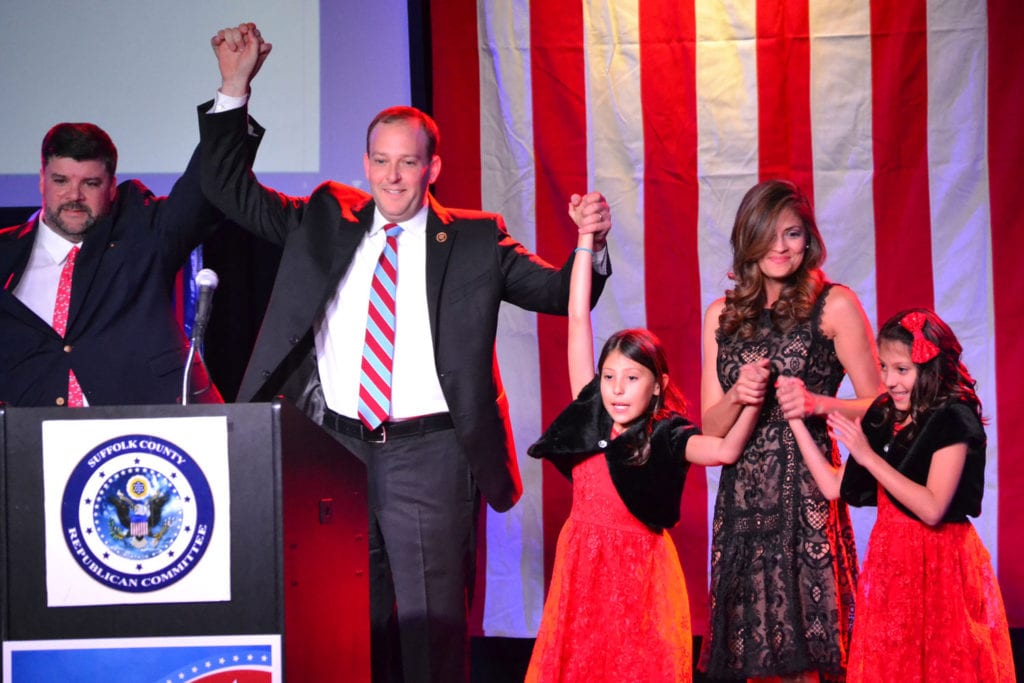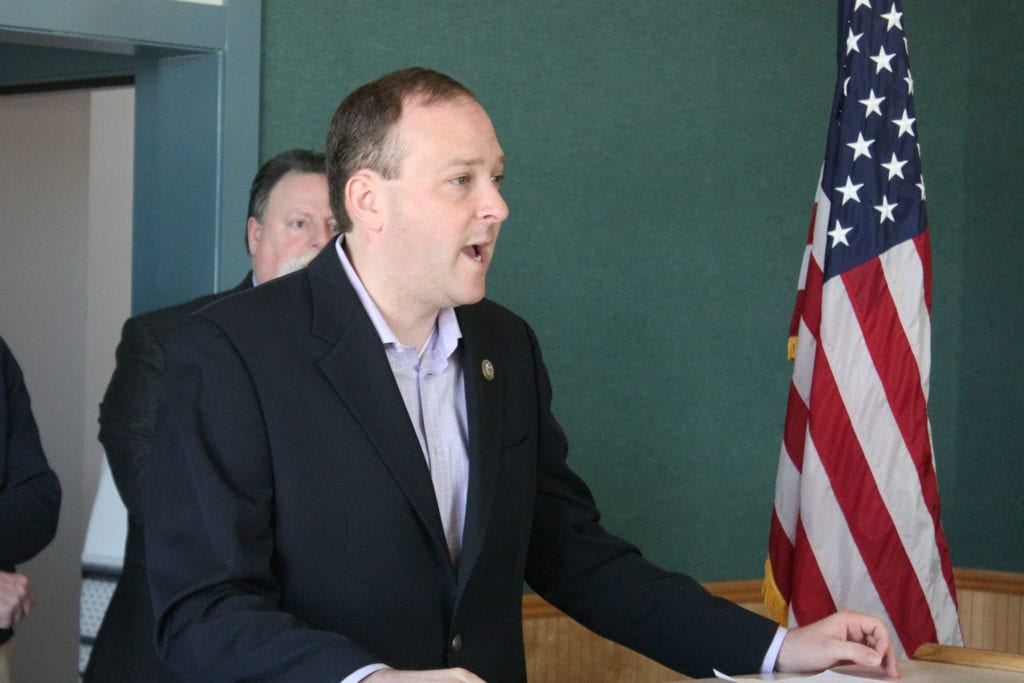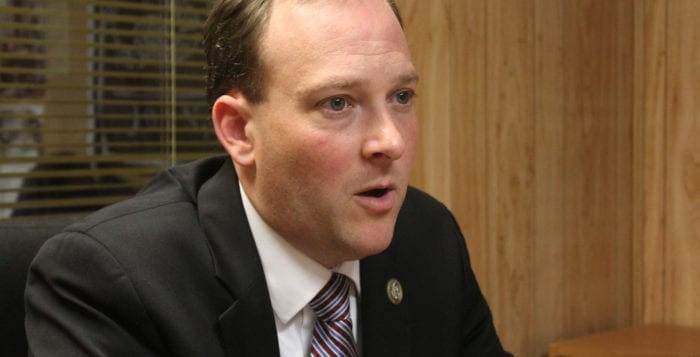By Alex Petroski
From the podium at The Emporium in Patchogue Nov. 8, 2016 after his race against Anna Throne Holst (D-Southampton) was officially called and his near-20-point victory was secured, U.S. Rep. Lee Zeldin (R-Shirley) said he was looking forward to the opportunity to “make America great again.”
Zeldin has become synonymous with President Donald Trump (R) locally, and though he said during an exclusive interview with the Times Beacon Record News Media editorial board he still supports the president, just short of 10 months removed from his re-election, Zeldin also said he is not a “proxy” for Trump, or anyone else. During the 90-minute interview, the congressman preached bipartisanship, addressed the future of health care, discussed Trump’s Twitter account and inflammatory speeches like the one he made in Arizona Aug. 22, criticized the president for his response to the Charlottesville, Virginia, protest and addressed the state of his support for Trump going forward.

“I don’t give anyone my proxy.”
Despite being a strong supporter of Trump during their parallel 2016 campaigns, Zeldin had a strong response when asked if the president had his unequivocal support.
“I don’t give anyone my proxy,” Zeldin said, though he did say he supports the president and wants him to be successful. He added if he had to vote for Trump again today, he ultimately would. “It’s not 2020, but if you asked me Aug. 25 of 2017 if I was casting a vote right now and he was running unopposed, yeah. If he was running against someone else and there was a compelling reason to go some other direction, then you factor into it.”
Zeldin pushed back on the perception of a large group of his constituents who believe he is the local embodiment of Trump. He cited several examples in which he has been critical of the president, including when Trump made a Holocaust remembrance statement that made no reference to Jewish people, or when he voted in line with many House Democrats against a bill that would roll back internet privacy protections, which Trump ultimately signed into law.
The congressman also reiterated a statement he has made publicly in the past, that the meeting between Donald Trump Jr., other members of the Trump administration and people with ties to the Russian government alleging they had damaging material on Hillary Clinton in June 2016 should have never taken place.
“If you really wanted to ask yourself, is this guy just going to be or has he been some proxy or some stooge who is refusing to say where he disagrees, you would have to ignore like 20 different examples where it’s not even taking my word for it, this is stuff that I’ve said on national TV,” Zeldin said. He surmised the perception he is too tightly connected to Trump comes from people who can’t wait for the day Trump is no longer in office.
Zeldin added although he disagreed with former President Barack Obama (D) on issues, at no point did he view him as anything other than his president.
“There are people who think nothing has gotten done.”
Zeldin pushed back on the idea that partisan gridlock, which has long characterized the country’s perception of Congress, is getting worse or is being amplified by Trump. He said bills are being passed and bipartisan discussions are being had everyday by members of the House.
“People have this perception that when the House is in session and we’re all on the floor together that it’s an old school Aaron Burr duel taking place amongst all members all the time,” he said. “Where everyone’s basically literally trying to kill each other on the floor.”
Zeldin said he isn’t going to sugarcoat it, or try to make the discussions sound all rosy. He pointed to the over 50 bills passed since Trump has taken office as proof of Republicans and Democrats working together to get things done.
He said these topics tend to get overshadowed by what is broadcasted on TV news.
“People get very discouraged when you put on the news and you’re only coming in contact with bad news,” Zeldin said. “It’s almost like [it’s] not even newsworthy to talk about what got done that day. What’s newsworthy is what may be the biggest, most dramatic confrontation or battle that might be going on. That’s the news everyday.”
He attributed heated political rhetoric and the notion Congress is struggling to work together to the business model of the three major 24-hour cable news stations — CNN, Fox News and MSNBC.
“The information they’re coming in contact with is deliberately targeting them to stir emotion, because that’s how they get traffic,” he said.
The congressman recalled several times when he was slated to do a cable news interview on a particular topic, which the president would be happy to see gain coverage, only to be asked questions about the investigations into Trump’s ties to Russia during the campaign because of a Tweet he sent moments before the interview.
He admitted the president has the power to steer the conversation in the right direction.
“There is no person in the United States of America with more of an ability to drive the conversation,” he said. “I don’t know of the last time we had an individual in the United States of America with a bigger soapbox than the president of the United States.”

“He’s willing to sign 50,000 different versions of this bill.”
Common ground exists between Republicans and Democrats on the future of the federal health care law, according to Zeldin, though he said he’s skeptical of the Senate’s ability to reach a majority on a replacement of the Affordable Care Act. At no point during the 90-minute conversation did the congressman use the phrase “repeal and replace,” though he discussed, at length, some of the issues with the individual market and what it would take to repair it in a way that works.
“Beyond partisanship there’s an ideological difference on the insurance piece, and what do you do with the ACA,” Zeldin said. “They just absolutely, genuinely to their core disagree on certain components of what direction [to go in].”
Zeldin was extremely critical of the process that led up to the ultimately failed Senate vote on health care and stressed the need to return to regular order.
The health care vote revealed three Republican senators as willing to oppose the president on major legislation. As a result of that vote and other circumstances in which Republican senators have spoken out against Trump, Zeldin encouraged the use of the president’s “bully pulpit,” like the way he spoke about Sen. John McCain (R-Arizona) and Sen. Jeff Flake (R-Arizona) during his trip to Phoenix Aug. 22.
When asked if the president is doing enough to grow his base of support rather than just appealing to those he already has in his camp, Zeldin was also critical.
“There are opportunities for him to do more to broaden that coalition,” he said.
He also indicated the president is prepared to compromise on a health care bill.
“He’s willing to sign 50,000 different versions of this bill,” Zeldin said.
“There is no moral equivalency.”
The congressman was most critical of the president on his response to the events in Charlottesville. He repeatedly stated there is no moral equivalency between marchers on the side of the KKK and Nazism and those who attended the rally to oppose hate, a point that was contradictory to statements Trump made publicly on the subject. Zeldin said he did agree though with the president’s point that members of the “alt-right” were not the only one’s who arrived at the Virginia rally for the purpose of inciting violence.
“If you are a good person showing up to that march and you realize once you get there that by being associated at all with that march that you are associating yourself in any way, shape, or form with the KKK or Nazism, a good person, immediately, instinctively completely disengages,” Zeldin said.







